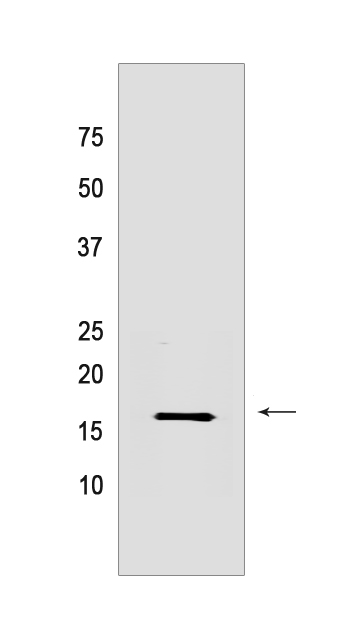FHIT Rabbit mAb [RH7Q]Cat NO.: A43828
Western blot(SDS PAGE) analysis of extracts from HepG2 cells.Using FHIT Rabbit mAb [RH7Q] at dilution of 1:1000 incubated at 4℃ over night.
Product information
Protein names :FHIT,FHIT_HUMAN,Bis-triphosphatase
UniProtID :P49789
MASS(da) :16,858
MW(kDa) :17KDa
Form :Liquid
Purification :Protein A purification
Host :Rabbit monoclonal IgG
Isotype :IgG
sensitivity :Endogenous
Reactivity :Human,Mouse,Rat
- ApplicationDilution
- 免疫印迹(WB)1:1000-2000
- The optimal dilutions should be determined by the end user
Specificity :Antibody is produced by immunizing animals with a synthetic peptide of human FHIT.
Storage :Antibody store in 10 mM PBS, 0.5mg/ml BSA, 50% glycerol. Shipped at 4°C. Store at-20°C or -80°C. Products are valid for one natural year of receipt.Avoid repeated freeze / thaw cycles.
WB Positive detected :HepG2 cells
Function : Possesses dinucleoside triphosphate hydrolase activity (PubMed:12574506, PubMed:15182206, PubMed:8794732, PubMed:9323207, PubMed:9576908, PubMed:9543008). Cleaves P(1)-P(3)-bis(5'-adenosyl) triphosphate (Ap3A) to yield AMP and ADP (PubMed:12574506, PubMed:15182206, PubMed:8794732, PubMed:9323207, PubMed:9576908, PubMed:9543008). Can also hydrolyze P(1)-P(4)-bis(5'-adenosyl) tetraphosphate (Ap4A), but has extremely low activity with ATP (PubMed:8794732). Exhibits adenylylsulfatase activity, hydrolyzing adenosine 5'-phosphosulfate to yield AMP and sulfate (PubMed:18694747). Exhibits adenosine 5'-monophosphoramidase activity, hydrolyzing purine nucleotide phosphoramidates with a single phosphate group such as adenosine 5'monophosphoramidate (AMP-NH2) to yield AMP and NH2 (PubMed:18694747). Exhibits adenylylsulfate-ammonia adenylyltransferase, catalyzing the ammonolysis of adenosine 5'-phosphosulfate resulting in the formation of adenosine 5'-phosphoramidate (PubMed:26181368). Also catalyzes the ammonolysis of adenosine 5-phosphorofluoridate and diadenosine triphosphate (PubMed:26181368). Modulates transcriptional activation by CTNNB1 and thereby contributes to regulate the expression of genes essential for cell proliferation and survival, such as CCND1 and BIRC5 (PubMed:18077326). Plays a role in the induction of apoptosis via SRC and AKT1 signaling pathways (PubMed:16407838). Inhibits MDM2-mediated proteasomal degradation of p53/TP53 and thereby plays a role in p53/TP53-mediated apoptosis (PubMed:15313915). Induction of apoptosis depends on the ability of FHIT to bind P(1)-P(3)-bis(5'-adenosyl) triphosphate or related compounds, but does not require its catalytic activity, it may in part come from the mitochondrial form, which sensitizes the low-affinity Ca(2+) transporters, enhancing mitochondrial calcium uptake (PubMed:12574506, PubMed:19622739). Functions as tumor suppressor (By similarity)..
Tissue specificity :Low levels expressed in all tissues tested. Phospho-FHIT observed in liver and kidney, but not in brain and lung. Phospho-FHIT undetected in all tested human tumor cell lines.
Subcellular locationi :Cytoplasm. Mitochondrion. Nucleus.
IMPORTANT: For western blots, incubate membrane with diluted primary antibody in 1% w/v BSA, 1X TBST at 4°C overnight.


